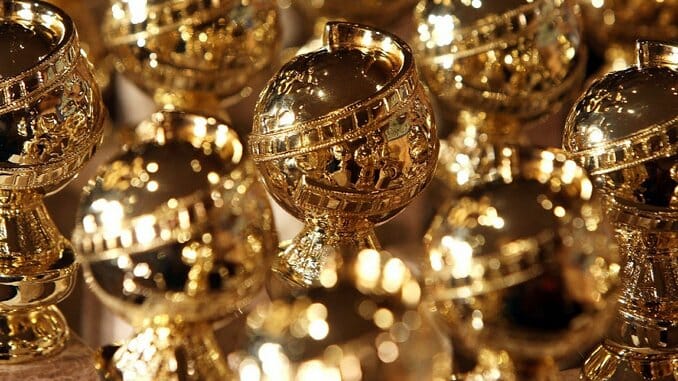The Golden Globes Don’t Deserve Coverage. Here’s Why
Photo by Frazer Harrison/Getty
This story has been updated to reflect the Golden Globes’ sale and transition to a for-profit entity.
The Golden Globes, the film and TV awards distributed by the Hollywood Foreign Press Association, aren’t worth covering. It doesn’t matter how deeply down the awards season rabbit hole you happen to be, how desperately devoted your Oscar parties are—they’re bad in every conceivable way and every time they’re covered, they maintain their power.
Instead of constantly posting new records of their nominations and winners, we’re going to dig into what the HFPA is, what its members ostensibly do and why the Golden Globes’ track record means that they should fade into obscurity rather than continue getting lucrative TV deals. The problems with the Globes are threefold: Shady HFPA membership with questionable credentials, a history of corruption and bribery, and a parasitic shock-jock relationship with the industry.
That’s putting aside Brendan Fraser’s claim that he was blacklisted because former HFPA president Philip Berk groped him (Berk was finally ousted in 2021 after calling Black Lives Matter a “racist hate movement”). That’s also putting aside the racist controversy that happened around 2020’s slate of films, when the HFPA decided that the American-made Minari wasn’t eligible for Best Picture categories and had to compete only in the Foreign Language category because it’s primarily in Korean.
Yes, those are already pretty major things to put aside, but in the latter case, the Oscars haven’t exactly had a spotless racism record. The difference is that the Oscars, as an extension of the industry organization The Academy of Motion Picture Arts and Sciences, made initiatives and changes to both their voting body’s demographics and to the films they consider. How effective are they? Well, that’s worth its own piece. But at least those more prestigious awards have a share of people behind them that are cognizant of their own power in writing the canon of film in the public eye.
So, back to the Globes and why they’re bad. First is who the HFPA actually is. On its face, it’s ~95 people living in southern California who write (or at least have written) for non-U.S. publications. Their application has changed since 2018, now requiring:
- Publication of at least 24 stories in the last three years
- Evidence that these publications pay for these stories
- Sponsorship by two current HFPA members
- MPAA accreditation
It’s unclear if the organization is still requiring the $500 initiation fee. What is clear is that the HFPA is still incredibly insular and small. The Oscars’ Academy has 9,599 current voters, over 100 times more. But that’s not a huge problem on its face: Critics groups around the world are small, regional organizations of qualified individuals. “Qualified” is the sticking point here.
Since the HFPA is notoriously clandestine when it comes to who is actually in the organization, let’s focus on the three new members admitted to the HFPA in 2020: Yulia Charysheva, Sabrina Joshi and Danielle Kool. Charysheva is a marketing director for a film company. Joshi is the daughter of a longtime HFPA member. None of them—as far as I can tell—have published any film criticism, reviews or essays in the past year. Instead, their portfolios include rewritten press releases and softball interviews with questions like “Do you know how you’ll be celebrating this Valentine’s Day?” We won’t even touch on the eight stories/year number, which most writers in our industry knock out—conservatively, of course—in a few months.
Then you’ve got the even weirder stragglers: Caroline Framke notes that HFPA members’ claims to fame span playing Gandhi on Star Trek: Voyager, not publishing anything at all or being “just plain curious,” as Russian bodybuilder/HFPA voter Alexander Nevsky explained. This seemingly random assortment of members without any real journalistic or critical rigor feeds into rampant, long-standing claims of a “culture of corruption” that prioritizes junkets (promotional tours that boil down to freebie trips where such aforementioned interview softballs can be lobbed) and other general starfuckery.
-

-

-

-

-

-

-

-

-

-

-

-

-

-

-

-

-

-

-

-

-

-

-

-

-

-

-

-

-

-

-

-

-

-

-

-

-

-

-

-








































